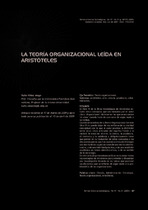Mostrar el registro sencillo del ítem
La teoría organizacional leída en Aristóteles
| dc.contributor.author | Vélez Maya, Tulio | |
| dc.coverage.spatial | Seccional Medellín | spa |
| dc.date.accessioned | 2021-01-20T13:34:57Z | |
| dc.date.available | 2021-01-20T13:34:57Z | |
| dc.date.issued | 2009 | |
| dc.identifier.issn | 1794-8347 | |
| dc.identifier.uri | http://hdl.handle.net/20.500.11912/7460 | |
| dc.description | p. 67 - 73 | spa |
| dc.description.abstract | El libro VI de la Ética Nicomáquea de Aristóteles estudia cinco conceptos que son llamados por el autor cinco ‘disposiciones’ distintas en las que se encuentra ‘el alma’ cuando trata de acercarse de algún modo a la verdad. Cuando un estudioso de la Teoría Organizacional lee este libro VI no puede dejar de maravillarse de la claridad conceptual con la que el autor plantea la distinción entre estas cinco actitudes del espíritu frente a la verdad. Se trata de: el arte, la ciencia, la prudencia, el intelecto y la sabiduría y obligatoriamente tiene que pensar en la traducción de estos conceptos a las discusiones que se suscitan cuando se trata de distinguir una teoría de las organizaciones de una teoría administrativa, o de una habilidad práctica, o de una erudición académica en temas administrativos, o de un sentido de la estrategia. En este artículo pretendemos utilizar en la mejor forma los conceptos de Aristóteles para orientar y dinamizar una investigación fecunda en los temas que plantean las disciplinas que se refieren de algún modo a la problemática de las organizaciones. | spa |
| dc.description.abstract | The book VI of Aristotele’s Nicomaquean Ethic studies five concepts that the author calls five different “dispositions” of the soul when tries to come close in any way to the truth. When someone interested in Organizational Theory reads this book VI, cannot avoid marveling with the conceptual clarity of the author in presenting the differences between these five attitudes of the spirit towards the truth. It is related to: the art, the science, the prudence, the intellect, the wisdom and it necessarily has to think how to translate these concepts in the discussions that arise when one tries to differ between an organizational theory and an administrative theory, or a practical ability, or an academic erudition in administrative subjects, or a strategy sense. In this article we pretend to use Aristotele’s concepts in the most convenient way to orient and give dynamism to a fertile investigation in the subjects that are presented by the disciplines related in some way with the organizations’ problems. | spa |
| dc.format.mimetype | application/pdf | |
| dc.language.iso | spa | |
| dc.publisher | Universidad Pontificia Bolivariana | spa |
| dc.relation.ispartof | Revista Ciencias Estratégicas | spa |
| dc.rights | Attribution-NonCommercial-NoDerivatives 4.0 International | * |
| dc.rights.uri | http://creativecommons.org/licenses/by-nc-nd/4.0/ | * |
| dc.subject | Ciencia | spa |
| dc.subject | Administración | spa |
| dc.subject | Estrategia | spa |
| dc.subject | Teoría organizacional | spa |
| dc.subject | Aristóteles | spa |
| dc.subject | Science | spa |
| dc.subject | Administration | spa |
| dc.subject | Strategy | spa |
| dc.subject | Administration theory | spa |
| dc.subject | Aristoteles | spa |
| dc.title | La teoría organizacional leída en Aristóteles | spa |
| dc.type | article | spa |
| dc.rights.accessRights | openAccess | spa |
| dc.type.hasVersion | publishedVersion | spa |
| dc.description.sectional | Medellín | spa |
| dc.identifier.instname | instname:Universidad Pontificia Bolivariana | spa |
| dc.identifier.reponame | reponame:Repositorio Institucional de la Universidad Pontificia Bolivariana | spa |
| dc.identifier.repourl | repourl:https://repository.unab.edu.co/ |


